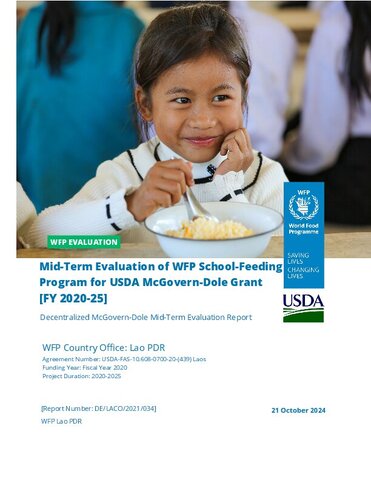
The midterm activity evaluation, covering the period of September 2021 to March 2024, was commissioned by the WFP Lao PDR Country Office and examines project performance since baseline and identifies lessons to inform operational and strategic decision-making. The evaluation has dual objectives of accountability and learning, particularly to inform future school feeding initiatives and support timely and informed decision-making regarding programming and resource allocation for the National School Lunch Program (SLP).
The midterm evaluation questions correspond to relevance and coherence, effectiveness, efficiency, impact, and sustainability criteria.
Key evaluation findings include;
- Relevance and coherence. The McGovern-Dole project is relevant to the education, literacy, nutrition, and health needs of its target beneficiaries, in alignment with the Government priorities. The project is actively implementing recommendations from the Systems Approach for Better Education Results (SABER-SF) assessment conducted in 2023 by WFP and partners.
- The evaluation found that food items provided for school meals were sufficiently nutritious and in line with acceptable global standards in food assistance, while work to increase the local palatability of particular food items (lentils) is ongoing.
- Effectiveness. At midterm, activities are generally on track toward expected results. The project has achieved 50 percent or higher life of project targets for 17 out of 23 standard output indicators. WFP and partners have reached over 60 percent of the life-of-project (LOP) targets for individuals reached.
- The overall good quality of activities is recognized by community members and key stakeholders. Positive outcomes have been observed in student attendance and dropout rates. While overall literacy outcomes remain low at the midterm, students are showing steady improvement since the baseline study in 2022. The project is making progress on establishing a kitchen, storeroom, and water source in schools, but there are concerns around the sustainability of these infrastructure investments after WFP’s exit. At the midterm, the support to smallholder farmers is currently nascent and planned for the second half of the project.
- Challenges exist with community contribution to school feeding, which are underpinned by a lack of project monitoring and reporting in this area. The project M&E system does not have a structured approach to project reflection and learning.
- Project activities consider gender equality and women empowerment in implementation but there is limited reflection or planning on how this can be improved. The project does not capture disability-disaggregated information.
- Efficiency. Activities are being implemented in a timely manner. The project has appropriately recovered from the delays caused by the COVID-19 pandemic and is on track to complete all activities within the project timeframe.
- Impact and sustainability. WFP’s contribution to the development of the Minister Decree for School Lunch Promotion (2023) is a key example of national-level strategic engagement and policy support. At the community level, the suite of activities to increase educational, health and hygiene outcomes is showing positive impacts on the knowledge, attitude and behaviours of students, caregivers/parents and teachers.
- There is an appropriate and sufficient focus on building the capacity of village education development committees (VEDC), which is important because of their pivotal role in supporting school feeding.
- Inflation and the increasing costs of food and fuel will have a large impact on sustaining project results, particularly around community contributions to school meals.
- The evaluation agrees that the Government is currently not ready to integrate the McGovern-Dole project schools into the SLP. WFP is currently working closely with the MoES to develop a joint Action Plan that includes a detailed post-2025 transition strategy, with associated readiness milestones.
- Lessons Learned. The lessons from WFP’s engagement so far outlined a need to invest in inter-ministerial coordination. The momentum generated from recent Government commitments to school feeding should be capitalized on in the remaining half of the project. Key operational lessons include primarily community mobilizations and community engagement activities. The project has also observed the importance of monitoring and tracking all components of school meals, specifically the community contributions to schools.
The evaluation recommends two strategic recommendations and six operational recommendations including:
Strategic
- Continue to strengthen the Technical Working Group for School Meals, to foster inter-ministerial collaboration.
- Strengthen district-level capacity for monitoring and community engagement.
Operational
- Given its nascency of the agricultural component and market linkage of the project, set the foundations for strong agriculture-focused work in future initiatives.
- Update Standard Operating Procedures for each activity component, based on experience and reflections from implementation.
- Strengthen the monitoring system of the project, and ensure information is shared with the National School Lunch Program.
- Ensure key lessons and good practices on project processes and results are efficiently and effectively documented to shape future initiatives in school feeding and catalyze innovation in the National School Lunch Program.
- Document all modalities of capacity strengthening provided to Village Education Development Committees, given they play an instrumental role in ensuring the success of school meals implementation in Lao PDR.
- Work with project schools to develop a continuation plan for school meals under the national program.
- Expand the scope of work for the end-line evaluation to include methodological considerations proposed at midterm.
